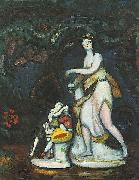Großhandels China Öl Gemälde & Rahmt Ein |
|||||||||||

|
|||||||||||
|
|
|
||||||||||||||
|
Bela Ivanyi-Grunwald
(6 May 1867 - 24 September 1940) was a Hungarian painter, a leading member of the Nagybenya artists' colony and founder of the Kecskemet artists' colony. Born in Som, Ivenyi-Grenwald began his artistic studies under Bertalan Szekely and Keroly Lotz at the Academy of Fine Arts in Budapest (1882-86) and continued them at Munich in 1886-87 and at the Academie Julian in Paris from 1887 to 1890. From 1891 he again worked in Munich; in 1894 he travelled with Ferenc Eisenhut to Egypt, where he painted several oriental-themed works. Beginning in 1889 he had regular exhibitions at the Palace of Art in Budapest. Characteristic of his early pictures is A Hader kardja ("The Warrior's Sword", 1890), a proto-Symbolist treatment of rural genre showing the influence of Jules Bastien-Lepage. After his return to Munich, Ivenyi-Grenwald painted a large-scale genre painting entitled Nihilistek sorsot heznak ("Nihilists Drawing Lots", 1893), a work as notable for its dramatic use of chiaroscuro as for its deeply felt subject-matter. In response to a state commission for the 1896 Millennium Exhibition in Budapest he produced an enormous academic history painting. |
||||||||||||||
|
|
||||||||||||||
|
||||||||||||||
|
|
||||||||||||||
| Bela Ivanyi-Grunwald
(6 May 1867 - 24 September 1940) was a Hungarian painter, a leading member of the Nagybenya artists' colony and founder of the Kecskemet artists' colony. Born in Som, Ivenyi-Grenwald began his artistic studies under Bertalan Szekely and Keroly Lotz at the Academy of Fine Arts in Budapest (1882-86) and continued them at Munich in 1886-87 and at the Academie Julian in Paris from 1887 to 1890. From 1891 he again worked in Munich; in 1894 he travelled with Ferenc Eisenhut to Egypt, where he painted several oriental-themed works. Beginning in 1889 he had regular exhibitions at the Palace of Art in Budapest. Characteristic of his early pictures is A Hader kardja ("The Warrior's Sword", 1890), a proto-Symbolist treatment of rural genre showing the influence of Jules Bastien-Lepage. After his return to Munich, Ivenyi-Grenwald painted a large-scale genre painting entitled Nihilistek sorsot heznak ("Nihilists Drawing Lots", 1893), a work as notable for its dramatic use of chiaroscuro as for its deeply felt subject-matter. In response to a state commission for the 1896 Millennium Exhibition in Budapest he produced an enormous academic history painting. before 1903(1903) Oil on canvas 63X50.5 cm cjr |
||||||||||||||
|
Related Paintings to Bela Ivanyi-Grunwald :. |
||||||||||||||
|
|
||||||||||||||
|
|
||||||||||||||
|
KONTAKTIEREN Sie UNS |







